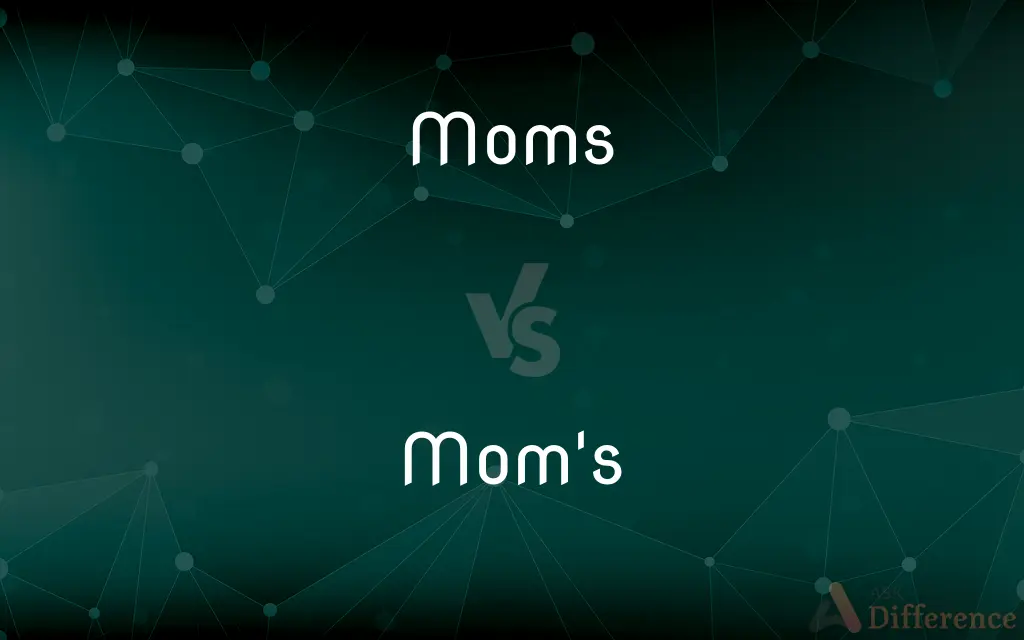Moms vs. Mom's — What's the Difference?
By Fiza Rafique & Urooj Arif — Published on February 25, 2024
Moms refers to plural mothers, emphasizing more than one mother, while Mom's signifies possession, relating to something that belongs to or is associated with a mother.

Difference Between Moms and Mom's
Table of Contents
ADVERTISEMENT
Key Differences
"Moms" collectively refers to multiple mothers, often used to discuss their roles or experiences in a general sense. For example, a discussion about moms sharing parenting tips highlights the communal aspect. On the other hand, "Mom's" is used to denote ownership or association with a single mother, such as in "Mom's advice," which focuses on the individual.
In terms of grammar, "Moms" is the plural form of "Mom," used when referring to more than one mother. This form is common in contexts where the experiences or attributes of mothers are generalized. Conversely, "Mom's" incorporates the apostrophe to indicate possession, showing that something belongs to or is related to the mother, making it specific to her.
When discussing community or group activities, "Moms" is appropriate, as it encompasses all participants within that category. For instance, talking about "Moms in the park" refers to multiple mothers together. However, "Mom's" perspective is singular, emphasizing individual possession or characteristics, like in "Mom's recipe," which is unique to her.
Usage context for "Moms" typically involves general discussions or when addressing groups, making it inclusive. Meanwhile, "Mom's" usage is more intimate or personal, pointing to specific items, qualities, or advice directly associated with one's mother, highlighting the personal connection.
The distinction impacts the tone of communication. "Moms" can create a sense of community or shared experience among mothers, while "Mom's" brings a personal touch, focusing on the singular, intimate aspects of the relationship with a mother.
ADVERTISEMENT
Comparison Chart
Meaning
Plural of "mom," referring to multiple mothers.
Possessive form of "mom," indicating ownership or association.
Usage
General discussions about mothers.
Specific references to something belonging to or related to one mother.
Grammatical Role
Plural noun.
Singular possessive noun.
Context
Community, groups, or general reference.
Personal, individual, or specific items/qualities.
Tone
Inclusive, community-oriented.
Intimate, personal, individual-focused.
Compare with Definitions
Moms
Mothers collectively.
The community center offers classes for moms.
Mom's
Denoting possession of an item.
This is Mom's favorite book.
Moms
As a term of endearment or inclusion in groups.
The moms in our neighborhood formed a support group.
Mom's
Belonging to or associated with a mother.
Mom's cooking is the best.
Moms
Used in expressions about mothers in general.
Moms around the world share similar challenges.
Mom's
Pertaining to a specific aspect of a mother.
Mom's handwriting is so neat.
Moms
Referring to a group with common characteristics.
The moms in the book club decided to meet weekly.
Mom's
Indicating a preference or habit.
Mom's morning routine includes a long walk.
Moms
In discussions of societal roles.
Working moms often juggle multiple responsibilities.
Mom's
Relating to advice or wisdom from one's mother.
I always follow Mom's advice.
Moms
Plural of mom
Common Curiosities
What does "Mom's" signify?
"Mom's" denotes possession or something associated with a specific mother.
What does "Moms" imply?
"Moms" refers to more than one mother, emphasizing a collective or group.
Is the apostrophe in "Mom's" always necessary?
Yes, when indicating possession or specific association with one mother.
Is "Mom's" used in formal writing?
Yes, but its use depends on the context and the possessive structure required.
Is "Mom's" only used for physical items?
No, it can also refer to non-physical attributes like advice or habits.
Can "Moms" be used to address a group directly?
Yes, it can be used as a direct address in conversations or communications.
Does the use of "Mom's" personalize the discussion?
Yes, it makes the reference more intimate and specific to one's mother.
How do I know when to use "Moms" or "Mom's"?
Use "Moms" for plural references to mothers and "Mom's" for indicating possession or association with one mother.
Can "Moms" imply a sense of community?
Yes, it often denotes a collective or shared experience among mothers.
Can "Moms" and "Mom's" be used interchangeably?
No, they serve different grammatical purposes and convey different meanings.
How does adding an apostrophe change the meaning of "Mom"?
The apostrophe transforms "Mom" from a singular or plural noun to a possessive noun, indicating ownership or association.
Does "Moms" always refer to biological mothers?
Not necessarily; it can refer to any women acting in a mothering role.
Are there exceptions to using "Moms" or "Mom's"?
The primary exception lies in the intent of the message, whether it's about plurality or possession.
How does context affect the choice between "Moms" and "Mom's"?
Context determines whether the reference is to a group or something specific to one mother.
Can "Moms" refer to a specific group with shared interests?
Yes, it can refer to mothers united by common interests or experiences.
Share Your Discovery

Previous Comparison
Nike Tanjun vs. Nike Revolution 5
Next Comparison
Ribeye Steak vs. Delmonico SteakAuthor Spotlight
Written by
Fiza RafiqueFiza Rafique is a skilled content writer at AskDifference.com, where she meticulously refines and enhances written pieces. Drawing from her vast editorial expertise, Fiza ensures clarity, accuracy, and precision in every article. Passionate about language, she continually seeks to elevate the quality of content for readers worldwide.
Co-written by
Urooj ArifUrooj is a skilled content writer at Ask Difference, known for her exceptional ability to simplify complex topics into engaging and informative content. With a passion for research and a flair for clear, concise writing, she consistently delivers articles that resonate with our diverse audience.
















































